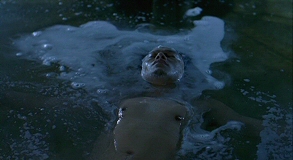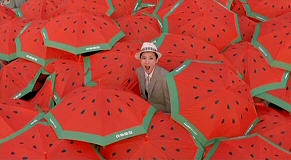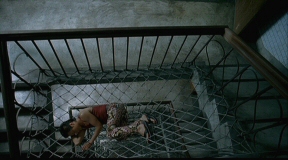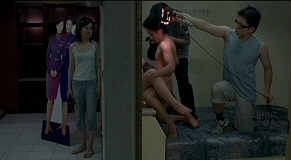The Wayward Cloud (Tsai Ming-liang, 2005)
 The Wayward Cloud, a rare
(first?) stumble from Taiwanese auteur Tsai Ming-liang, at least proves that a
subpar effort from the director is still not much to be ashamed of. A tenuous
sequel to What Time Is It There?, one of Tsaiís best works, Cloud features
two of that filmís protagonists played by the same actors (Lee Kang-sheng
& Chen Shiang-chyi). Leeís character is asked at one point whether he
still sells watches, and Chenís still has her familiar suitcase, though
sheís returned to Taiwan from her stay in Paris. They each seem to be
continuing their life from the previous film, albeit somewhat implausibly.
Leeís character has become an actor in porno films. Chenís now runs an adult
video library. They meet one another, and begin a tentative relationship, which
is stymied by his reluctance to tell her about his new career and his refusal to
have sex with her.
The Wayward Cloud, a rare
(first?) stumble from Taiwanese auteur Tsai Ming-liang, at least proves that a
subpar effort from the director is still not much to be ashamed of. A tenuous
sequel to What Time Is It There?, one of Tsaiís best works, Cloud features
two of that filmís protagonists played by the same actors (Lee Kang-sheng
& Chen Shiang-chyi). Leeís character is asked at one point whether he
still sells watches, and Chenís still has her familiar suitcase, though
sheís returned to Taiwan from her stay in Paris. They each seem to be
continuing their life from the previous film, albeit somewhat implausibly.
Leeís character has become an actor in porno films. Chenís now runs an adult
video library. They meet one another, and begin a tentative relationship, which
is stymied by his reluctance to tell her about his new career and his refusal to
have sex with her.
 Itís a setup that hits on many of
Tsaiís thematic obsessions, though it has to be said that The Wayward Cloud
feels less like a sequel to What Time Is It There? than a loose
remake of The Hole, another of Tsaiís films, with which it shares no
direct plot connections. As in that film, Cloud takes place in a version
of Taiwan afflicted by a water-related disaster (a drought this time instead of
a flood), features musical numbers, and is set primarily in one apartment
building. The obsession with bodily functions that surfaces in all of Tsaiís
films, resurfaces here as well, prompting most of the directorís Tatiesque
gags. Weíre made privy to the squishy sex noises created as Lee diddles a
watermelon wedged between a womanís legs. We see a shower sex scene requires a
grip to provide the shower, since the faucets have been turned off. Weíre
asked to giggle as a water bottle is lost inside a porno modelís vagina. Too
often this stuff is not funny enough to inspire more than immature tittering, no
matter how thematically relevant it might be. It seems obvious that itís
intended on another level to disturb us (certainly the comatose porn shoot later
in the film does), but to underline the fact that the porn industry objectifies
women and creates social alienation is pretty facile.
Itís a setup that hits on many of
Tsaiís thematic obsessions, though it has to be said that The Wayward Cloud
feels less like a sequel to What Time Is It There? than a loose
remake of The Hole, another of Tsaiís films, with which it shares no
direct plot connections. As in that film, Cloud takes place in a version
of Taiwan afflicted by a water-related disaster (a drought this time instead of
a flood), features musical numbers, and is set primarily in one apartment
building. The obsession with bodily functions that surfaces in all of Tsaiís
films, resurfaces here as well, prompting most of the directorís Tatiesque
gags. Weíre made privy to the squishy sex noises created as Lee diddles a
watermelon wedged between a womanís legs. We see a shower sex scene requires a
grip to provide the shower, since the faucets have been turned off. Weíre
asked to giggle as a water bottle is lost inside a porno modelís vagina. Too
often this stuff is not funny enough to inspire more than immature tittering, no
matter how thematically relevant it might be. It seems obvious that itís
intended on another level to disturb us (certainly the comatose porn shoot later
in the film does), but to underline the fact that the porn industry objectifies
women and creates social alienation is pretty facile.
 The cutting here is sometimes much
faster than in Tsaiís last few films, and the overall rhythm suffers as a
result. Tsaiís carefully constructed movies achieve a sort of somber majesty
at their very best but here too many of the longueurs just feel long. Iíd
suspect the juxtaposition of brief comic scenes and longer, sadder scenes was to
blame, but thatís always been Tsaiís modus operandi, and itís never been a
problem before. The affectless performances might be to blame (More words come
from TV broadcasts than the filmís cast.), but again, thatís not an uncommon
element in the directorís work. Maybe itís just that since his films are
always such balancing acts, the slightest of miscalculations can cause them to
feel ďoffĒ. Thereís still some incredible imagery on display here from
time to time, such as when shampoo seems to enclose Leeís head in the titular
cloud or when we see him sleeping suspended over a vertiginous stairwell, but
these moments are just isolated moments. Throughout, the imposing landscape of
the city makes the few people that move throughout it almost feel like
afterthoughts, and Tsaiís decision to frame his leads so that even when they
share a frame oneís usually leaving or sleeping pays off thematically, but not
really emotionally.
The cutting here is sometimes much
faster than in Tsaiís last few films, and the overall rhythm suffers as a
result. Tsaiís carefully constructed movies achieve a sort of somber majesty
at their very best but here too many of the longueurs just feel long. Iíd
suspect the juxtaposition of brief comic scenes and longer, sadder scenes was to
blame, but thatís always been Tsaiís modus operandi, and itís never been a
problem before. The affectless performances might be to blame (More words come
from TV broadcasts than the filmís cast.), but again, thatís not an uncommon
element in the directorís work. Maybe itís just that since his films are
always such balancing acts, the slightest of miscalculations can cause them to
feel ďoffĒ. Thereís still some incredible imagery on display here from
time to time, such as when shampoo seems to enclose Leeís head in the titular
cloud or when we see him sleeping suspended over a vertiginous stairwell, but
these moments are just isolated moments. Throughout, the imposing landscape of
the city makes the few people that move throughout it almost feel like
afterthoughts, and Tsaiís decision to frame his leads so that even when they
share a frame oneís usually leaving or sleeping pays off thematically, but not
really emotionally.
 Itís a shame that little else pays off
here. The Wayward Cloud is ultimately too ambiguous in its meanings to
have much impact. Though the tone is obviously sad, and the film is examining
sexual alienation, itís difficult to ascertain its specific attitudes. The
final scene is certainly desperate, but itís simultaneously a fulfillment of
the longing thatís existed throughout, so it feels cathartic. The porn
industry is being looked at in a negative light here, though itís clearly a
perceptive industry thatís quick to incorporate any societal malaise into its
bag of tricks and itís not without its therapeutic uses. The highly sexual
musical numbers might be intended to provide an escapist release, but most of
them fail to transport us away from the main plot. Maybe theyíre supposed to
be, like the pornography thatís being created, inadequate fantasy devices, but
a sequence late in the film, filled with dancers carrying watermelon umbrellas does
manage to liven things up, so itís tough to say for sure. The Wayward
Cloud frustrates because it has all of the right elements of Tsaiís usual
work, but little of his usual poeticism. Clearly Tsaiís work, it falls short
of his usual cohesive standards. As the title implies, watching the film is an
experience thatís rather directionless.
Itís a shame that little else pays off
here. The Wayward Cloud is ultimately too ambiguous in its meanings to
have much impact. Though the tone is obviously sad, and the film is examining
sexual alienation, itís difficult to ascertain its specific attitudes. The
final scene is certainly desperate, but itís simultaneously a fulfillment of
the longing thatís existed throughout, so it feels cathartic. The porn
industry is being looked at in a negative light here, though itís clearly a
perceptive industry thatís quick to incorporate any societal malaise into its
bag of tricks and itís not without its therapeutic uses. The highly sexual
musical numbers might be intended to provide an escapist release, but most of
them fail to transport us away from the main plot. Maybe theyíre supposed to
be, like the pornography thatís being created, inadequate fantasy devices, but
a sequence late in the film, filled with dancers carrying watermelon umbrellas does
manage to liven things up, so itís tough to say for sure. The Wayward
Cloud frustrates because it has all of the right elements of Tsaiís usual
work, but little of his usual poeticism. Clearly Tsaiís work, it falls short
of his usual cohesive standards. As the title implies, watching the film is an
experience thatís rather directionless.
57
07.13.05
Jeremy Heilman